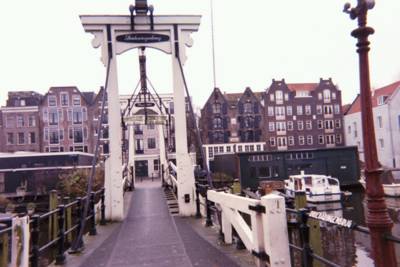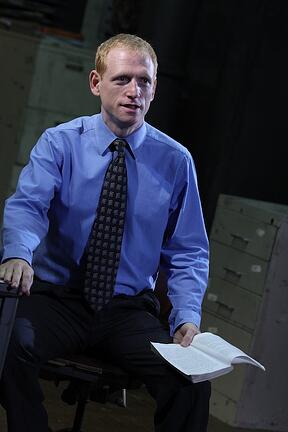
Gatz
 I saw Gatz in New York on Friday. A friend of mine had a spare ticket and she offered it to me, if I would just take the day off from work and get myself from Boston to New York in time for the 3:00 pm curtain.
I saw Gatz in New York on Friday. A friend of mine had a spare ticket and she offered it to me, if I would just take the day off from work and get myself from Boston to New York in time for the 3:00 pm curtain.
Early start time, right? Not if you're proposing to stage every single word of The Great Gatsby in one go, it's not.
So yeah, Gatz is something else, all right. Six and a half hours (eight if you count all of the 15-minute stretch breaks and an hour-long dinner break) of non-stop read-aloud Fitzgerald.
Holy cow, did I love this play.
Now, if you look around online for reviews of Gatz, you'll see that most people mention having read it when they were in high school. It's just one of those books, right? Like Catcher in the Rye or To Kill A Mockingbird. The Glass Menagerie. Everybody's read them because everybody was made to read them.
Actually, no. Through whatever accident of fate and shifting curricular priorities, I was never assigned to read The Great Gatsby, never had to write a thoughtful essay on its themes and motifs, never had to plumb the depths of its symbolism in pursuit of its ineffable truth.
Do they still have tracks in schools these days? Because in my relatively small public school, we were corralled rather firmly into the three tracks of AP, College Prep, and whatever euphemistic term they used to classify that murky hinterland between "average student" and "special ed." I shudder to think of that hinterland now, where everyone from the violently disturbed to the merely shy were shunted together into classes where some woefully underpaid and overworked teacher struggled mightily to address this cornucopia of needs.
My mother was just such a teacher, so I know.
I, meanwhile, floated reasonably happily above all of this in my all-AP courseload, loving English, confused by science, and reduced to tears by math. I wasn't a straight-A student by any stretch, but I pulled in a steadily respectable melange of As and Bs each year. I was satisfied with me, at least.
And I rather suspect that it was in those swollen CP classes that the standard rituals of the great American literary canon were enacted. Because I never read Gatsby in high school. Nor, when reading Catcher in the Rye, did I ever grew rigid with self-recognition at the character of Holden Caulfield. Never doodled the name Mrs. Atticus Finch into the covers of my notebooks.
Shocking, isn't it?
Instead, we in our AP ivory towers confined ourselves to -- wait for it -- mostly 19th century greats. And their hydra-headed antecedents, of course. We struggled with Homer. Dabbled in Chaucer. Exposed ourselves to Shakespeare. Wrestled with Hawthorne. I think we flirted with the 20th century just long enough to memorize the greater part of The Love Song of J. Alfred Prufrock, and to know that reading Joyce was a thing we should aspire to.
But Fitzgerald, Hemingway, and beyond -- we pretty much just said goodbye to all that.
Of course I picked up Gatsby at some point. Some summer reading challenge or another -- I always participated in these -- had it in their lists and I raced through it, briskly and unthinkingly before I moved on to tackle the rest of the pile before Labor Day hit. I was exposed to -- and briefly memorized most of -- To Kill a Mockingbird when I was assistant stage director for a local theatrical production of it. Ditto for The Glass Menagerie.
There's something important in that, I think.
While it is not, I think, possible to read too many novels, it is entirely possible to read too many at once. To resist the penetration of each book's heart into your own. To avoid, through sheer literary gluttony, the tasting of each succulent syllable on your lips, the weight of it in your gut. When I was finally forced to hear the words of these books spoken aloud -- as in the theatre -- and to live with them in my head for weeks on end -- as a member of the crew -- only then were they able to truly get under my skin.
The Glass Menagerie is still one of my favorite plays. And I still know whole tranches of it by heart.
Gatz is a play that does that to you. It forces you to take this marvelous, thrilling book out of whatever stale, hurried context you originally encountered it in, and to plant yourself in a chair for the duration. To open yourself up to it, with an almost obscenely decadent luxury of time.
It's every single word of it, read and performed on stage.
But it's more than that. Gatz isn't just a reading of The Great Gatsby, isn't just an acted-out, obsessively verbatim version of the thing.
It's about reading it.
Gatz is actually a depiction of what it's like to come across a truly wonderful bit of writing, and then to be thrown headlong into its grip. There are scenes in Gatz where your narrator -- even as he is morphing into the narrator of the book, Nick Carraway himself -- is almost literally getting knocked around by the action of the book, bucketed about the stage by the events and the words used to relate them like a helpless sailor in a storm. All the while, his face is plastered with the incredulous grin of someone who's found himself in the grip of something much, much bigger than he'd expected, and who is just hilarious with the delight and thrill of it all.
But of course the arc of the story sweeps on, and hilarity turns to tragedy, hope to despair, and finally our hero trades in one fast yellow car for a slow yellow train home.
The story of The Great Gatsby is magnificent, and magnificently told.
Gatz tells the story of what it's like to get caught up in that magnificent story, to get sucked in by its entirely likable narrator, to be raised ecstatically up by its startling prose, and then dashed against the rocks of its shattering end.
Gatz is still playing at the Public Theatre in New York. Its run has just been extended to May 13. After that, it's off to London for the summer.
Go see it.
